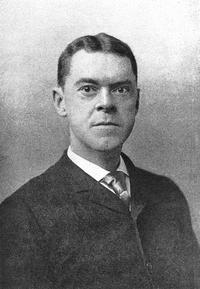The Nathaniel Ilsley family of Portland, Maine (and later Chelsea, Massachusetts; Buffalo and Troy, New York; and Newark, New Jersey) produced more than a dozen singers, violinists, and conductors – and at least two composers. One of these last was my great-great-grandfather, Francis Grenville Ilsley (1831–1887), and the other was his younger brother, Eliphalet Clark Ilsley (1837–1866). Frank (or Grenville) wrote at least two hymn tunes that are still in general use – Ilsley and Dania – while Clark (or Clarke) ventured South and spent the Civil War years as the choirmaster of St. Paul’s Church in Augusta, Georgia.
Uncle Clark was probably named for Dr. Eliphalet Clark of Portland (1801–1883), a contemporary of his father Francis Lunt Ilsley (1804–1874). He appears at an early age in Charles H. Kaufman’s Music in New Jersey, 1655–1860 (1981), performing in Newark between 1854 and 1859. The earliest composition by E. Clarke Ilsley I’ve been able to find is The Yankee Privateer, published by Oliver Ditson & Co. in 1854. In January 1855, Musical World noted Ditson’s recent publication of two songs by E. C. Ilsley: Belle of the Year and Helen May. A year later, he can be found in Manhattan in association with his uncle Ferdinand Ingersoll Ilsley (1808–1890), who later sold pianos from a shop on Broome Street, but by 1860 E. C. Ilsley was teaching music in Syracuse.
I have to think E. C. Ilsley and E. Clarke Ilsley the same man, so how and why did Uncle Clark end up in Augusta during the Civil War? He was evidently an industrious composer as well as a choirmaster for St. Paul’s Church, turning out songs like Kiss Me Before I Die, Mother, advertised in the Southern Cultivator as “the gem song of the times” and retailing for $1; The Soldier’s Suit of Gray; How Can I leave Thee?; and Yes, We Think of Thee at Home, an answer to Do They Think of Me at Home? and dedicated to Miss Letty Yonge. Though he died in 1866, E. Clarke Ilsley’s publisher Blackmar brought out (or perhaps reissued) My Love, my last thoughts are of thee in 1883.
The poet Grenville Mellen (1799–1841) was probably F. G. Ilsley’s namesake; like F. L. Ilsley and Eliphalet Clark, Mellen was a prominent figure in the Portland of 1830. While all of Frank Ilsley’s siblings appear in Kaufman’s Music in New Jersey, 1655–1860, he does not; for that matter, unlike E. Clarke Ilsley Frank was slow to publish his works, and all of the ones I’ve been able to trace date from the 1870s and 1880s, following his marriage.
Beginning in the late 1870s, by now the father of two sons, F. G. Ilsley began to publish his compositions at a brisk clip: Sleep, O! Sleep (1877; perhaps for his son Beekman, born in 1873?); Gavotte (1881, the year my great-grandmother was born); Though Lost, Yet Loved! and Why the Cows Came Late (1882); Sweet Love and I (1883); Softly Now the Light of Day (1885); and There’s a Wideness in God’s Mercy (1887).
F. G. Ilsley also appeared in concerts as a pianist, as at a musicale in Newark in January 1886, when he played two works by Arthur Foote. Nicholas E. Tawa’s biography of the composer (Arthur Foote: A Musician in the Frame of Time and Place [1997]) quotes a letter from Ilsley to Foote about the concert’s “instant success… The ‘Gavotte’ is strongly written and while quaint & old fashioned in a way, leans decidedly to the modern advanced school – The ‘Eclogue’ I especially fancy.” (p. 155)
When Ilsley died in 1887, his obituary in The Bloomfield Citizen (2 April 1887) called him “the well-known music teacher” and noted that he left a widow, two sons, and a daughter. Two weeks later, The American Register in London recorded the death of “Mr. Frank G. Ilsley, a well-known musician of Newark, [who] died in that city March 30th, at about forty-five years of age. He was a musician from his boyhood, and played in many churches in New York and Newark.”
My great-great-grandmother Mrs. F. G. Ilsley (Emily Anne Finlay, born in 1848) died in 1895, leaving her sons Beekman and Francis, Jr., and her daughter Sara Theodora Ilsley. I find no evidence of Frank and Emily Ilsley having been divorced, and she seemingly appears as his widow in that 1887 obituary, so who is the Mrs. F. G. Ilsley, “as the widow of the author,” renewing the copyright on Ilsley’s Down on the Sands in 1909? Another family mystery, evidently!
The series concludes here.
Share this:
About Scott C. Steward
Scott C. Steward has been NEHGS’ Editor-in-Chief since 2013. He is the author, co-author, or editor of genealogies of the Ayer, Le Roy, Lowell, Saltonstall, Thorndike, and Winthrop families. His articles have appeared in The New England Historical and Genealogical Register, NEXUS, New England Ancestors, American Ancestors, and The Pennsylvania Genealogical Magazine, and he has written book reviews for the Register, The New York Genealogical and Biographical Record, and the National Genealogical Society Quarterly.View all posts by Scott C. Steward →
